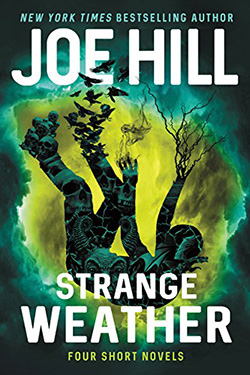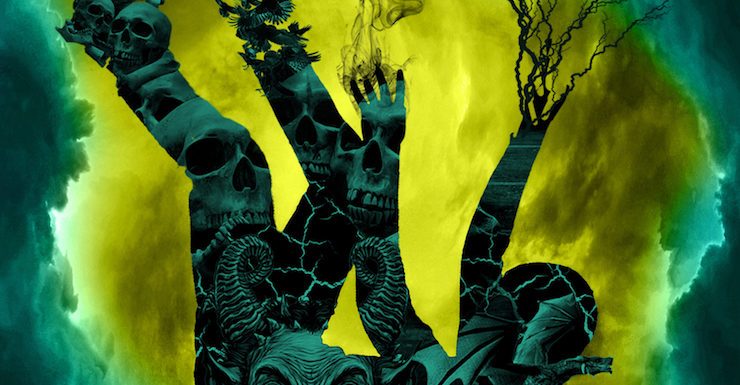The first thing I can remember is rain.
It sluiced across the windshield of the car, blurring the Scottish road ahead, so it was as if I looked upon the highway through carnival glass.
We were on our way to Loch Ness. I was six and obsessed with The Monster. My mother was driving us from our little rental outside London to Edinburgh, so we could have a look at the silver waters in the ancient glen. But the road flooded out and we never got there and The Monster was safe from us.
When I was seven, a waterspout walked up Sebago Lake, a silver whip that threw hundreds of fish on to the long straight road that runs alongside the water. I found some fish the next morning, amid the wreckage of branches and mud, and threw them back in, but they didn’t swim away, they just floated there.
Buy the Book


Strange Weather: Four Short Novels
In the winters of my childhood, in the heaviest of snowstorms, the skies sometimes groaned with thunder. Such occurrences were so freakish and uncommon, they would be a topic of conversation for weeks afterward. Now, though, here in New England, storms of this sort are typical in the cold months. The solemn white hush of falling powder is often interrupted by a deep and resonant boom that shakes the snow off branches. No one thinks anything of it.
It is said in Pompeii, the citizenry also grew quite comfortable with their mountain occasionally vomiting smoke, and the earth shuddering beneath their feet. If sparks shower from the sky as a regular thing, it will soon cease to merit notice.
In rural southern Maine, where I grew up, it rained tadpoles one muggy evening: revolting little squiggly sperm-like worms that hit the windows with black, wet smacks. In the days that followed, frogs pulled themselves up out of drains in sinks, were discovered hiding in the tailpipes of cars. Maybe you think I’m making this up, but go ahead: ask anyone who lived in that part of the state in 1982. It was a well-known, widely reported incident. In the month that followed, the roads around our house were covered in vivid splotches where frogs had been run over and exploded like water balloons filled with guts and yellow Gatorade.
When I was thirteen, I ran out into a thunderstorm, the sky throbbing with lightning, and shouted “Nah-nah-nah, you can’t hit me” in God’s general direction.
I leapt in puddles to throw great splashes, and boogied around until my clothes were soaked through and stuck to my skin. When I went inside—laughing at my parents’ alarm—I poured a cup of piping hot tea. As I lifted the mug to my lips to drink, the world was shattered with a great crash of thunder and I slopped most of the tea down my left arm. The burns took three weeks to heal and I never nah-nahed God again.
There are people who get paid to study the climate. You don’t ever think it might be studying us.
Yet it has been established that trees can pass information to one another, using underground fungal colonies as a kind of organic Internet. We don’t know what they’re saying. We can’t be sure they’re talking about us.
But it ought to make you think before you carve your lover’s name in a heart on the old oak tree in your yard.
In Alaska, a melting glacier has begun to bleed. Google it. McMurdo Valley. It gushes in a continuous arterial flood, a salty red torrent that tastes and smells like what it is: blood. The biologists attribute the salinity and the rich crimson color to a prehistoric alga, but you know blood when you see it. We all do.
More than fifty million humans die each year. We are the soil. A billion grains of human bone pack the dirt underfoot. The earth is a haunted house.
You ask yourself your purpose in life? The natural world tells you it is to be a womb for maggots, to swell and split open with a thousand of them, slick and writhing—to give birth to the next exuberant, humming generation of flies.
It is often remarked that only women can have children, but you see, we may all give birth to new young, after all.
The Internet is a storm system of static, of noise, of trivia, of shame and ego, striving and lies. Someday perhaps we will have meteorologists for information itself.
“The forecast,” they may tell us, “is for three days of hate and resentment, followed by a cat photo.”
Your brain is a thundercloud in which thoughts, dreams, and fears flicker and spark. Sometimes there comes a downpour. We call this weeping. It is the most natural and healthiest thing you can do.
If we really understood anything, we would all of us weep every day.
My oldest son, when he was little, used to sit in a circle at school with the other children and sing, “Windy weather, windy weather. When the wind blows, we all get together.” I heard him sing it dozens of times, and now, whenever there is a big blow, I sing it to myself. I have to sing it to myself. My oldest son doesn’t live with me anymore.
The people you love are your windbreak against what gales may come, and you are theirs. Huddle close and drink every moment of sunlight you are offered, every sweet drop of rain.
Joe Hill is the #1 New York Times Bestselling author of The Fireman, NOS4A2, and other books. His latest is Strange Weather, a collection of four short novels.










